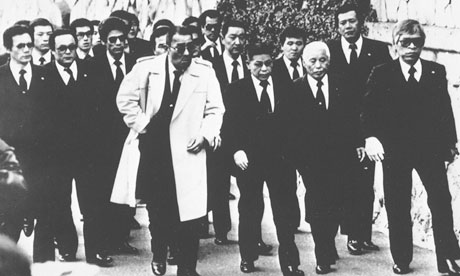by ANDREW RANKIN
 “Yakuza, seen here attending a memorial service for a former leader in 1988, are ‘amazingly gentlemanlike’, according to the current head of the Yamaguchi-gumi syndicate.” PHOTO/AP/Guardian
“Yakuza, seen here attending a memorial service for a former leader in 1988, are ‘amazingly gentlemanlike’, according to the current head of the Yamaguchi-gumi syndicate.” PHOTO/AP/Guardian
I – The Structure and Activities of the Yakuza
Japan has had a love-hate relationship with its outlaws. Medieval seafaring bands freelanced as mercenaries for the warlords or provided security for trading vessels; when not needed they were hunted as pirates.1 Horse-thieves and mounted raiders sold their skills to military households in return for a degree of tolerance toward their banditry.2 In the 1600s urban street gangs policed their own neighborhoods while fighting with samurai in the service of the Shogun. Feudal lords paid gang bosses to supply day laborers for construction projects. In the 1800s gambling syndicates assisted government forces in military operations.3 Underworld societies joined with nationalists to become a significant force in politics. For many years police colluded profitably with pickpocketing gangs before being ordered to eliminate them in a nationwide crackdown of 1912.4 In the 1920s yakuza bosses were elected to the Diet.5 In the postwar era police struggled to control violent street gangs. Business leaders hired the same gangs to impede labor unions and silence leftists. When Eisenhower visited Japan in 1960 the government called on yakuza bosses to lend tens of thousands of their men as security guards.6 Corruption scandals entwined parliamentary lawmakers and yakuza lawbreakers throughout the 1970s and 1980s. One history of Japan would be a history of gangs: official gangs and unofficial gangs. The relationships between the two sides are complex and fluid, with boundaries continually being reassessed, redrawn, or erased.
The important role played by the yakuza in Japan’s postwar economic rise is well documented.7 But in the late 1980s, when it became clear that the gangs had progressed far beyond their traditional rackets into real estate development, stock market speculation and full-fledged corporate management, the tide turned against them. For the past two decades the yakuza have faced stricter anti-organized crime laws, more aggressive law enforcement, and rising intolerance toward their presence from the Japanese public.
1991 saw the introduction of the Anti-Yakuza Law, which imposed tight restrictions on yakuza activities, even to the extent of deeming some otherwise legal activities to be illegal when performed by members of blacklisted gangs.8 A multitude of additions and amendments have followed, most recently in 2008. Other relevant new laws have included the Anti-Drug Provisions Law (1992), the Organized Crime Punishment Law (2000), and the Transfer of Criminal Proceeds Prevention Law (2007). These last two target yakuza profits by suppressing financial fraud, money-laundering, and transnational underworld banking. The Criminal Investigations Wiretapping Law (2000) increased the range of surveillance methods available to investigators of gang-related cases. So-called Yakuza Exclusion Ordinances, implemented at prefectural level across Japan between 2009 and 2011, aim to ostracize the yakuza even further by penalizing those who cooperate with them or pay them off.
The ‘ultimate symbiosis’ between the yakuza and the police that Karel van Wolferen described in 1984 does not endure today.9 Police hostility to the yakuza has intensified, with more raids of yakuza offices and yakuza-run businesses, more arrests of senior rather than street-level gangsters, and more confiscations of illicit yakuza profits. ‘Yakuza eradication’ has become popular policy, with politicians, governors, mayors, and lawyers’ associations all proclaiming their resolve to destroy the yakuza once and for all. Anti-yakuza campaigning has recently extended beyond the traditional yakuza world to address a broader sphere of activities deemed to be undesirable or antisocial.
However, difficulties in defining the intended targets of these countermeasures, along with a tendency to link organized crime to minority groups or ethnicity, have led some commentators to wonder whether things have gone too far. The Japanese media reports resistance to burgeoning police powers and concern that some new anti-yakuza legislation may prove harmful to legitimate businesses. The 21st-century yakuza must also deal with competition from organized gangs of non-yakuza criminals and from foreign crime gangs active in Japan. Before examining these issues, let us first take a broad look at the state of organized crime in Japan today.
The Asia Pacific Journal for more
read Part II
